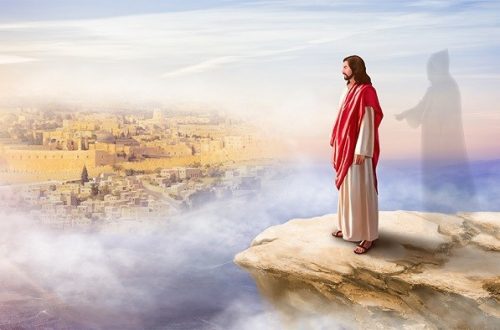Abraham, a life of faith
Title: Abraham, a life of faith
Aim: To emphasize that faith is a lifelong journey with God.
Scripture: Genesis 12:1–9
God summons Abraham, Genesis 12:1–3
Genesis is the book of beginnings. In this historical narrative, we find the beginnings of the material universe, human life, human sin, divine judgment on human sin, covenant promises, and the Israelite tribes—to name just a few.
Genesis provides a foundation for a great deal of what we can know about life and our Lord. Genesis is also the first of five books forming a group of their own at the beginning of the Old Testament.
Together, Genesis through Deuteronomy are usually called the “Torah” (meaning “law” or “teaching”) or the “Pentateuch” (literally, “five-volumed [book]”). Moreover, Genesis provides the background for the Exodus and wilderness settings of the other four books.
From a thematic standpoint, Genesis can be looked at as having two main parts: chapters 1–11 and 12–50. The first 11 chapters cover the time from the Creation to the birth of Abram (later called Abraham). Though in these chapters we meet certain key individuals, such as Adam and Noah, the scope takes in all humanity.
Next, in the book’s final 38 chapters, the time span covered is much shorter, namely, about three centuries. Also, the focus has narrowed to one family called by God to receive and transmit His blessings.
From start to finish, Genesis is a book of history, and its historical account is trustworthy, for the Spirit of God inspired the account. That said, we should not expect the book to provide a complete or systematic history of time from its origin until the Hebrews’ sojourn in Egypt.
The author’s concern was not history as a purpose or goal sought for its own sake. Instead, the writer used real people and historical events to teach eternal truths about God and humankind.
We learn, in particular, that Terah was the father of Abram, Nahor, and Haran, and that Haran had a son named Lot. Verse 28 notes that, while Haran was still relatively young, he died in Ur of the Chaldeans, which was the place where he was born.
Verse 29 supplies other details about Terah’s family. While Abram married Sarai, Nahor married Milcah. The background information provided in these verses helps to prepare the reader for upcoming events discussed in Genesis.
For instance, notice the brief statement in verse 30 that Sarai was barren. God would use this circumstance to mature the faith of Abram and Sarai.
To set in motion His grand plan, God needed one individual to become the progenitor of a holy nation (Israel), and He chose Abram of Ur for that role. From our limited human perspective, it remains unclear why God called this person and not someone else.
After all, despite whatever commendable qualities Abram may have had, he was deeply flawed. In fact, Joshua 24:2 reveals that at the time the patriarch was living in Ur, he and his family worshiped false gods. In short, the Creator showered an idolater with His unmerited favor.
Moreover, it might appear from Genesis 11:31 that God originally called Terah from Ur to go to Canaan. Yet, other passages make it clear that God called Abram to leave his homeland (Gen. 15:7; Neh. 9:7; Acts 7:2-3).
Abram began his journey to Canaan with his father, wife, and Lot, the patriarch’s nephew (Gen 11:27, 31). After traveling north along the Fertile Crescent trade route, the group arrived in Harran, where they stayed for a time, accumulating possessions and servants (12:5).
Why did Abram stop in Harran? Perhaps Terah, the patriarch’s father, was too weak to travel farther, or perhaps Terah felt more at home there, especially since the people of Harran also worshiped the moon god. While some attribute the stay in Harran to disobedience, others suggest that the stop was just a delay caused by family reasons.
Once Terah died (11:32), Abram continued his journey, obeying the message God had given the patriarch while he and his household were in Ur. God summoned Abram to leave everything that was significant to him—first his culture (including his native country and birthplace), second (more narrowly) his relatives, and third (even more narrowly) his family (12:1).
God also directed this elderly man to relinquish the security of his homeland and set out for an unknown destination. This must have seemed painful and risky to the patriarch. Nevertheless, along with Abram’s call came a blessing that surely acted as a powerful incentive for him to obey God.
The Creator’s unilateral pledge came in the form of a series of seven promises. In Scripture, seven was often viewed as the symbolic number of perfection.
First, even though Abram and his wife were past childbearing age, God promised to make the patriarch’s descendants into a great nation (v. 2). Second, God would personally “bless” Abram. The underlying Hebrew verb means that God would give the patriarch and his descendants the ability to flourish and be successful in serving as the Creator’s bondservants wherever they sojourned.
Third, God would make Abram famous (especially due to his prominence and considerable wealth). Fourth, God would make the patriarch a source (or channel) and prime example of blessing to others.
Fifth, God would bestow His favor on anyone who treated Abram with kindness (v. 3). Sixth, God would invoke harm on those who treated Abram with contempt. Seventh, all the families of the earth would be blessed through (and because of) the patriarch.
Here we find God’s blessing of creation now being carried forward to Abram in the form of what would eventually become a covenant (15:1–6; 17:1–2). In the garden, God had blessed Adam and Eve, giving them a fruitful place, endowing them with the ability to multiply, and making them rulers over creation. That was all ruined at the Fall.
Then, as God began to build His covenant people, He promised to give Abram’s descendants a fruitful land, a great nation, and an enduring dynasty.
From our perspective in time, we can see some of the ways these covenant promises were fulfilled. Abram became the progenitor of the Hebrew nation.
In the patriarch’s own day, he was rich, and ever since, he has been famous. His greatest descendant, Jesus Christ, has spread God’s redemptive blessings to people from all nations.
Of course, Abram did not live long enough to witness most of these fulfillments (yet, see John 8:56). As noted below, he had to accept the blessing and obey the call by faith (Heb. 11:8-10).
Abraham responds in faith, Genesis 12:4–9
Abram responded to God’s summons by immediately leaving Harran with the patriarch’s wife, Sarai, and Abram’s nephew, Lot (Gen 11:27), to travel to Canaan (12:4). The journey from Ur to Harran was about 700 miles. Likewise, the excursion from Harran to Canaan was an additional 700 miles.
The entourage took with them considerable possessions, slaves, and hired servants (v. 5). Yet, along with being old, Abram was also childless. So, his response to God was truly a step of faith. We realize, of course, that apart from God’s revelation, the patriarch likely would never have abandoned the safety and wealth of his homeland.
From a human perspective living in a comfortable house among friends and relatives outweighed the prospect of living in a tent as a foreigner in a far-off place. Yet, as observed earlier, when God called, Abram acted in trust, believing that the Creator was able to do what He had promised (Rom. 4:21).
Abram journeyed by stages through the land of Canaan from north to south, stopping at Shechem, Bethel (which literally means “house of God”), and the Negev (the semidesert, southern region; Gen. 12:6). The “great tree of Moreh” possibly refers to a well-known shrine (such as a sacred grove) for the veneration of local deities. Abram, however, despite his heathen past, worshiped the Lord there.
In the patriarch’s time, Canaan was thinly populated. Some urbanization had begun to occur at several fortified cities.
Yet, the area was far behind the standard of civilization Abram had left in Ur. The Canaanites venerated their pagan deities by performing detestable practices, the worst of which was offering children as burnt sacrifices to idols.
When the patriarch arrived, the Canaanites and Amorites occupied the land. The former were descended from Canaan, the grandson of Noah. The Amorites, whose origin is disputed, moved into Canaan in the years preceding Abram, causing considerable destruction and upheaval.
The preceding circumstance made it easier for the patriarch and his group to move freely through the promised land. At this time, the Canaanites were divided into city-states in which the monarchs had wide powers to raise an army, control lands, impose taxes, and compel subjects to take part in public projects.
It was against the above cultural backdrop that Abram demonstrated faith and obedience, and God honored the patriarch’s commitment. Specifically, when he arrived at Shechem, the Lord appeared to Abram and promised to give the land of Canaan to his descendants (v. 7).
This is the first time, according to the text, that God had visibly appeared to Abram since he left Ur, and the first time we know that God explicitly promised Canaan to Abram. In response to the Lord’s appearance, the patriarch built an altar and offered sacrifices.
The preceding act of devotion showed that Abram believed the Lord and was thankful for what He would do for His bondservant. At Bethel, the patriarch built another altar and again worshiped the Creator (v. 8). Then Abram continued south, where he settled for a while (v. 9).
The biblical record outlines Abram’s life in Canaan as tent-pitching and altar-building. So, the patriarch did not establish a permanent settlement in the land, but lived as a semi-nomad, moving his considerable flocks from place to place to find food and water.
While Abram was wealthy in possessions, he did not leave behind signs of his riches or prestige, only altars left as symbols of his faith in the Lord for a witness to the patriarch’s new pagan neighbors. Scripture gives us few details of where Abram went in Canaan, but what we are told about his stops in the land is significant.
For instance, Shechem, Bethel, and the Negev are all important places in the life of Jacob (chaps. 33–35), who inherited Abram’s covenant with God. That covenant was later renewed with Moses and the Israelites.
When the Israelites conquered Canaan, the battle plan after Jericho was to capture Ai. Before taking the city, the Israelites camped in the hills where Abram camped, between Bethel and Ai (Josh. 8:9, 12).
It is as if Abram and Jacob first took Canaan peacefully, by building altars and buying land. Then, the Israelites in the conquest came to reclaim what God had promised them long ago. From this summary we see that the God of the patriarchs showed His faithfulness through many later generations.
For thought and application
God is calling each of us. Some of us He is calling to take the first step of a lifelong journey with Him. Such involves admitting our sinfulness and trusting in His Son, Jesus of Nazareth, as our Lord and Savior. It is the most important step we can take.
For those who have already taken the first step, the journey has only begun. God continues to call, but often we have already scripted our life’s journey ourselves. We are involved with many activities and we do not want to listen.
What does God ask us to do? Students and athletes have been surprised when God called them to enter the ministry or become missionaries. Yet, God may ask us to do simpler things that are also challenging—for instance, sharing the gospel with someone seated next to us on a bus, or inviting a next-door neighbor to go to church with us.
As we live by faith, we have the privilege of serving the King of kings, Jesus the Messiah, who has promised to share His eternal inheritance with us. He invites us to share in all He has accomplished by His life, death, and resurrection.
We realize that Jesus is the One who has done all the work that makes the promise of eternal life possible. That is one reason we should point others to Him, and not to ourselves. We, in ourselves, have nothing to offer, but the Messiah has everything we need.
Living by faith means continually taking risks, stepping out of the familiar into the unfamiliar. Abram no doubt thought about the implications of obeying God and all the negatives of leaving, but he left anyway.
We can learn from Abram’s response what we should do when God calls. We need to recognize His call and willingly step out, no matter what the consequences.



